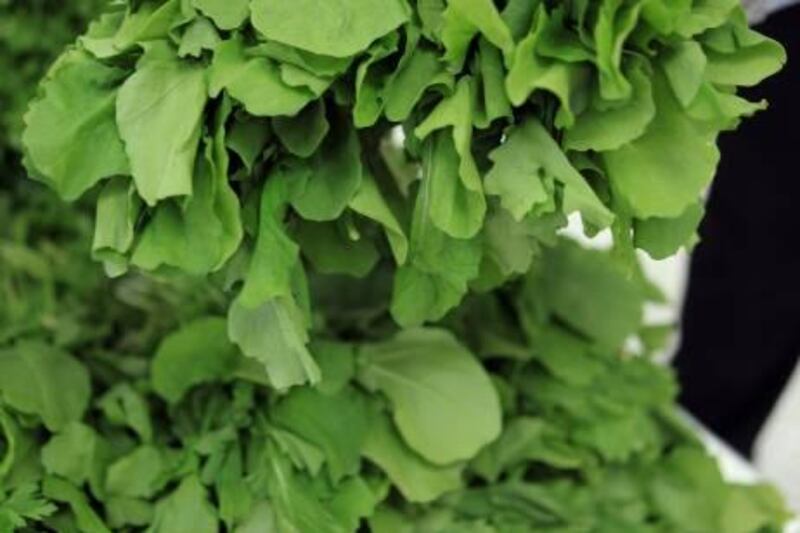DUBAI // Initial tests for E coli bacteria in rocket lettuce sold at leading grocery chains have returned reassuring results, but indicate lower levels of contamination in samples from Europe than those from the Middle East.
The tests were prompted after a researcher at American University of Sharjah found all 64 samples of rocket lettuce he bought in supermarkets in Dubai and Sharjah contained thousands of E coli bacteria per gram, well above the 100 bacteria per gram limit set by the UK and Germany.
In separate test results seen by The National, Barakat Vegetables and Fruits, which supplies rocket to Spinneys, Choithram and other major grocery chains, found its rocket lettuce had less than three bacteria per gram.
The leaves come pre-packed from one supplier in The Netherlands, according to Barakat's business development manager, Jithesh Jayaraj.
However, the rocket sourced from the Middle East, which is sold to Arabic restaurants but not in supermarkets, contained 460 bacteria per gram.
"Four hundred is not ideal," said Pooja Venugopal, a quality assurance officer. "The E coli group should be less than 100."
Barakat would have to consult with the Dubai Municipality as to whether it needed to lower those levels by sanitising the leaves or finding a new supplier, she said.
A harmful strand of the bacterium, E coli 157, was not found in the European or Middle Eastern samples.
In its own investigation, Spinneys said that E coli in its pre-packed rocket was "not detected". It did not provide the full test results.
Locally sourced rocket, sold as loose leaves, contained higher but still "small amounts" of the bacterium that could be removed if washed, a representative said.
In the American University of Sharjah tests, the results of which were published by Dr Dennis Russell in the Egyptian Academic Journal of Biological Sciences, the E coli bacteria levels remained high, despite three washings with diluted chlorine bleach.
The bacterium can cause diarrhoea, dehydration, respiratory problems, urinary tract infections, pneumonia and other illnesses.
In addition to thousands of E coli bacteria per gram, Dr Russell found hundreds of thousands of viable faecal coliform microorganisms per gram.
"Faecal contamination could mean anything from viruses to parasites and, at high levels, is an indication that a food is not suitable for human consumption," he said.
The levels of bacteria exceeded those found in a lavatory, he said. "That sounds sensational, but it's factual."
Rocket, which is also known as arugula, had much higher levels of contamination than other foods he tested, such as onions and mint. They posed an added risk, he noted, because they are usually consumed raw, in salads, for example.
The Dubai Municipality has said it had not had any confirmed cases of illness linked to E coli.
Khalid Mohammed Sharif, the municipality's director of food control, said: "To say that bacteria are causing harm to the public we need disease data as well."
E coli bacteria often originate in the fertiliser and soil used to grow produce on farms. Leafy vegetables in particular tend to absorb fertiliser.
[ chuang@thenational.ae ]





